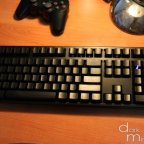Ducky Mechanical Keyboard
DK9008 with black-on-black ABS key caps
So, I got rid of my 20-dollar Logitech keyboard and bought my self a DK9008 mechanical keyboard from Taiwanese manufacturer Ducky Keyboard. Lame brand name aside, this is probably the best hardware investment I’ve ever made.
If it were possible to marry a keyboard, I…wouldn’t but the DK9008 is still a pretty darn good keyboard.
The world of mechanical keyboards is a secret subcultural gathering of people who are way too obsessed with the amount of pressure they need to depress plastic buttons so that they can discuss on online forums, while throwing around jargons like “Tenkeyless” and “NKRO”, in great details how awesome it is to type out what they are discussing while discussing it. It’s kind of meta.
I thought those people were crazy but mechanical keyboards are actually pretty cool if you swoon over them in moderation.
White balance is a bit off; the LEDs are actually blue
The basic idea is this: Most keyboards were once mechanical back in the lost era known as the 80s. By “mechanical”, it means that each key has its own physical “switch” that is triggered when you press the key. Sometime in between the 80s and modern times, rubber dome-switch keyboards (with rubber membranes instead of mechanical switches under the keys) were commercialized. Cheaper and easier to produce, they soon dominate the market and almost all keyboards today are dome-switch keyboards.
Mechanical switches come in many form, the most common of which are manufactured by a German company called Cherry, who specializes in making business-grade keyboards for POS (point-of-sale; not piece of shit) devices and server racks. The types of switches and technical bits are too much to cover, so check out this FAQ if you want. For those who care, my DK9008 uses Cherry MX Blue switches.
For a while, people who wanted mechanical keyboards had to rummage through eBay for condemned POS keyboards or ancient IBM Model M, but eventually many niche providers started providing higher-end customized coding/gaming keyboards, most of them using Cherry MX Blue, Brown or Black switches. Ducky is one of them; Filco, a Japanese brand, is another.
And more recently, mainstream brands such as Razer and SteelSeries also entered the market with their eyes on hardcore gamers (the logic being that mechanical keyboards are more resistant to wear-and-tear). The Cherry Corporation must be doing quite well selling all those switches to everyone.
So how exactly does a mechanical keyboard improve your typing skill, speed, intelligence and sexual stamina? Well, the specific details differ from individual to individual, but there are some general benefits.
Being marketed at enthusiasts, mechanical keyboards generally have better build quality. Many of them incorporate functionalities and manufacturing processes that are considered not cost-effective in regular keyboard production.
For example, my DK9008 has a removable USB cable; built-in options to disable the Windows key, to swap the Ctrl and Capslock keys (for programmers) and to swap the Windows and Alt keys (for Mac users); cool LED lights that are embedded into the -lock keys themselves; and full n-key rollover.
Mini USB slot behind the keyboard with cable guides
The main benefit of a mechanical keyboard, in my opinion, is faster typing because the switches produce a tactile feedback that allows your fingers to sense a keypress without full depression. But this is somewhat subjective because it involves personal preference, which is why Cherry manufactures different types of switches to carter to different tastes.
Cherry MX Blue switches are blue
The main drawback is that, depending on the switch mechanism used, the keyboard may sound significantly louder to type on. Again, some people actually prefer the louder sound as feedback mechanism. Personally, I don’t care about this either way. Cherry MX Blue is notorious for being the most “clicky” switch (you can listen to it here), but I chose it for the typing sensation. On the other hand, Cherry MX Brown and Black are basically the same as a regular rubber dome-switch keyboard in terms of noise.
I am really content with my DK9008. It’s much more pleasant to type on, especially if you learn that you don’t have to fully depress keys anymore. The sensation and tactile feedback take some getting used to but I can already feel myself typing faster.
In addition to the type of switch, Ducky also offers options for the key caps. I chose black-on-black (black text on black keys) key caps because I am too chicken to choose the completely blank key caps but want to look like I can type without having my keys labelled…which I can. Most of the time.
Special key caps and cap remover
The keyboard also came with a more wear-resistant set of WASD replacement key caps for gamers, but I prefer to keep my keys consistent.
That said, at the end of the day, it’s ultimately just a keyboard. I am content with the DK9008 because it fulfils my typing needs and I probably won’t need another one for 20 years or so, assuming that claims of mechanical keyboards’ longevity are true. I won’t be starting a mechanical keyboard collection any time soon, unlike the more hardcore enthusiasts.
Still, it’s pretty interesting how online communities can form around pretty much anything. Thanks to them, I now have a pretty sweet keyboard that makes me feel like I’m co-starring with Angelina Jolie in Hackers every time I type a blog post. Woot.
Mess with the best, die like the rest
P.S. Singaporeans can get Ducky keyboards from SmallWalrus on VR-Zone forums for around S$150 depending on options.
















February 13th, 2011 at 3:20 pm
I believe those cheap $10 keyboards you can get from Sim Lim are mechanical keyboards, otherwise my whole life has been a lie. Dx
That said, these keyboards hoard dust like a dragon hoards treasure. I need a rubber one so I can wash it. :|
February 13th, 2011 at 3:21 pm
By “membrane keyboard”, I’m not referring to the keys. I mean the rubber membrane underneath the keys replacing mechanical switches. All keyboards use rubber membranes these days.
Hmm I guess I should be clearer. Edited the post to “rubber dome-switch” instead.
February 13th, 2011 at 7:18 pm
You can throw the Model M into the dishwasher for cleaning, don’t know about the new clicky keyboards though :<
February 13th, 2011 at 9:48 pm
Damn…I used to have an old IBM clicky keyboard kicking around, but I think it got thrown out. Twas PS2 and MASSIVe though.
February 14th, 2011 at 8:34 pm
Hmm, you know I’ve been wanting to try out these mechanical keyboards in forever. Hasn’t seemed like a worthy investment at the moment sadly, still looking at the unicomp ones though. :\
February 16th, 2011 at 1:12 pm
how can you stand the sound of that clicky noise when ur typing. So. Loud.
February 16th, 2011 at 5:27 pm
Dude, that sound is beautiful.
February 17th, 2011 at 10:52 am
Yeah it’s nice once you get used to it. But I guess that depends on the person, which is why there are non-clicky mechanical switches.
February 24th, 2011 at 10:01 am
I showed this to my girlfriend, who recently bought a new computer. She is a web developer. I asked her why it would be useful to swap the Ctrl and Caps Lock keys, but she did not know. Can you explain?
February 27th, 2011 at 8:20 pm
The Ctrl key is located at where the Capslock is for certain Solaris and Unix machines and some Linux users prefer this. I suppose it makes it easier to hit all the Ctrl hotkeys used in programming IDEs.
March 1st, 2011 at 6:43 am
Ah, okay. Thanks.